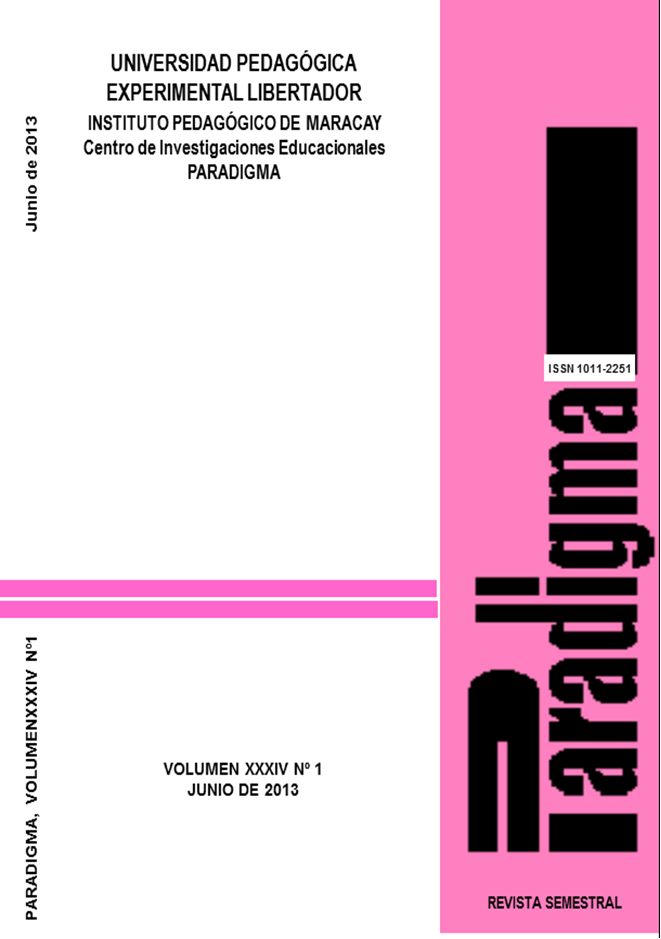DESPUÉS DEL TRABAJO ¿QUÉ SIGNIFICADO TIENE EL OCIO, EL TIEMPO LIBRE Y LA SALUD?
DOI:
10.37618/PARADIGMA.1011-2251.2013.p31-51.id508Resumo
La investigación tuvo como propósito indagar la percepción que tienen los trabajadores acerca del ocio y el tiempo libre. Se desarrolló una investigación cualitativa, de campo de nivel descriptiva. Participaron en el estudio 60 trabajadores que laboran en un complejo industrial petroquímico. Se recurrió a los grupos focales para la recolección de la información. Los resultados revelaron que para los trabajadores, resulta poco claro discernir entre lo que significa ocio y tiempo libre, quedando estos aspectos sumergidos en actividades que no garantizan el entretenimiento, la relajación y el desarrollo personal y en consecuencia reparar el desgaste psicofisiológico generado por el trabajo. Esto queda evidenciado en el hecho que, indistintamente del sexo, para los trabajadores su tiempo libre queda subsumido a otras actividades que les garantizan ingresos adicionales o en actividades domésticas u obligaciones familiares. De igual manera el ocio es percibido bajo el estigma social de no hacer nada. Consideran que el factor principal que limita el aprovechamiento del tiempo libre en actividades ajenas al trabajo es la falta de recursos y programas asequibles a sus ingresos. El ocio y el tiempo libre no se perciben como factores fundamentales para la salud.Palabras clave: Ocio, uso del tiempo libre, trabajo AFTER WORK: WHAT DOES LEISURE, LEISURE AND HEALTH?AbstractThe research target was to research about workers’ perception on leisure and free time. It was developed a field qualitative research at descriptive level. The study was realized with 60 workers from petrochemical industrial center. It was used focus groups to data collection. The results showed that the workers do not see clear the difference between leisure and free time Leaving these aspects immersed in activities doesn’t ensure the entertainment, relaxation and personal development and consequently repair the psychophysiological weathering generated by the work. They are confounding with others different aspects. The workers used the free time to others remunerative activities or domestic activities or compulsory family activities. In the same way, the leisure is perceived as the social stigma; of doing nothing at all. The workers considered that the main factor that limits the use of the free time in activities that aren’t related to work are the few resources and programs adequate for their salaries. Finally, the leisure and free time are not perceived as fundamental factors to health.Keys Words: Leisure, use of free time, workDownloads
Não há dados estatísticos.
Downloads
Métricas
Visualizações do artigo: 144 PDF (Español (España)) downloads: 46
Como Citar
Sánchez Tovar (UC), L., Jurado (UC), L., & Simões Brasileiro (UFPB), M. D. (2014). DESPUÉS DEL TRABAJO ¿QUÉ SIGNIFICADO TIENE EL OCIO, EL TIEMPO LIBRE Y LA SALUD?. PARADIGMA, 34(1), 31–51. https://doi.org/10.37618/PARADIGMA.1011-2251.2013.p31-51.id508
Edição
Seção
Artículos


 English
English
 Español (España)
Español (España)
 Français (France)
Français (France)
 Português (Brasil)
Português (Brasil)




















































